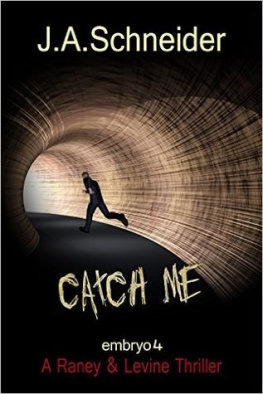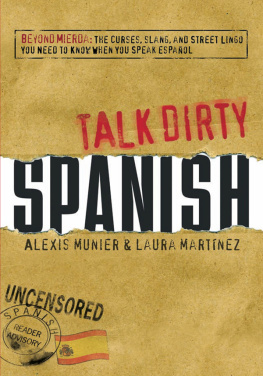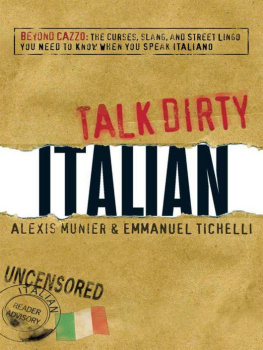
BEYOND DREK: THE CURSES, SLANG, AND STREET LINGO YOU NEED TO KNOW WHEN YOU SPEAK YIDDISH

ILENE SCHNEIDER

Avon, Massachusetts
Copyright 2008 by Ilene Schneider
All rights reserved.
This book, or parts thereof, may not be reproduced in any form without permission from the publisher; exceptions are made for brief excerpts used in published reviews.
Published by
Adams Media, an F+W Publications Company
57 Littlefield Street, Avon, MA 02322
www.adamsmedia.com
ISBN 13: 978-1-59869-856-5
ISBN 10: 1-59869-856-7
eISBN: 978-1-44051-602-3
Printed in Canada.
J I H G F E D C B A
Library of Congress Cataloging-in-Publication Data
is available from the publisher.
This publication is designed to provide accurate and authoritative information with regard to the subject matter covered. It is sold with the understanding that the publisher is not engaged in rendering legal, accounting, or other professional advice. If legal advice or other expert assistance is required, the services of a competent professional person should be sought.
From a Declaration of Principles jointly adopted by a Committee of the American Bar Association and a Committee of Publishers and Associations
Many of the designations used by manufacturers and sellers to distinguish their product are claimed as trademarks. Where those designations appear in this book and Adams Media was aware of a trademark claim, the designations have been printed with initial capital letters.
Interior illustrations iStockphoto.com/Matt Knannlein.
This book is available at quantity discounts for bulk purchases.
For information, please call 1-800-289-0963.
This book is dedicated to all those who spoke the
rich, colorful, dynamic language known as Yiddish,
and to those who are committed to keeping the
language just as alive and vibrant today.
Contents
CHAPTER ONE
A Brokh Tsu Dayn Lebn!: Curses and Curse Words
CHAPTER TWO
A Shprikhvort Iz a Vorvort: A Proverb Is a True Word
CHAPTER THREE
Bei Mir Bist Du Shoen: Its All Yinglish to Me
CHAPTER FOUR
Iz Nisht Kosher: Words Familiar to English Speakers
CHAPTER FIVE
Vi Iz Ayer Nomen?: Whats in a Name?
CHAPTER SIX
Freg Mikh BKherem: Outside the Pale
CHAPTER SEVEN
Shtadlans and Shnorrers: The Public Sphere
CHAPTER EIGHT
Ess, Ess, Mein Kind: Gastronomical Judaism
CHAPTER NINE
Frailikh Zol Zein: Its a Good Life
CHAPTER TEN
Altsding Lozst Zikh Ois mit a Gevain: When Things Go Bad
CHAPTER ELEVEN
Shlemiels, Shlimazels, and Shlubs: How to Insult Someone
CHAPTER TWELVE
Lokh in Kop: The Basics of Body Language
CHAPTER THIRTEEN
Trikhen a Forts: The Dirtiest Yiddish
CHAPTER FOURTEEN
Oy, Ikh Darf Zikh OyspishnGeferlekh!: Other Useful Words
Acknowledgments
My appreciation goes to Paula Munier, acquisitions editor of Adams Media, who had faith that I could write this book, to her assistant, Sara Stock, who shepherded me through the process, and to Katrina Schroeder, who shaped the manuscript into its final form.
My thanks to those who did not want to be acknowledged by name, but gave me words and phrases and advice.
Thanks to my mother, whose own mother was more comfortable speaking in Yiddish than English, for her memories of her childhood. And to my father who, despite having grown up with parents who did not speak Yiddish and a grandmother who did not want to speak it, still picked up a lot of phrases.
And profound, deep gratitude to my husband, Rabbi Gary M. Gans, who proofread the manuscript, and gave me ideas and suggestions, and caught all my typos. I could not have produced this book without him.
Preface
This book will not teach you how to speak Yiddish. Instead, it will teach you various idiomatic phrases and colloquial vocabulary words that can be sprinkled in your conversation to enrich and enliven it, to give it some texture and interest.
In addition, the words are not just listed by subject matter and then translated. There are mini-essays scattered among the definitions that add a sociological and historical context to the vocabulary. The information will help non-Jews understand the milieu in which Yiddish developed and flourished, and contains some little known facts and trivia to interest knowledgeable readers.
It has been my intention to present a book that is both informative and entertaining, without being either too academic or too superficial. I hope I have succeeded.
INTRODUCTION
Talking Dirty...
in Yiddish?
How to talk dirtyin Yiddish? I always thought it could not be done, that there are curses but not curse words in Yiddish. But Yiddish does have vulgarisms, coarse language, colorful insults, and offensive words. It even has the equivalent of four-letter Anglo-Saxon expletive deleteds. This book will teach you how to use them allbut will not guarantee that you will still have any friends afterwards.
Shortly after being asked to write this book, I was at a conference attended by several Yiddish speakers, and mentioned the project to some I met. Their universal reaction was: How to talk dirty in Yiddish? Cant be done. My informants were all women of a certain age, and professional Yiddishists and linguists. When I mentioned the topic of the book to casual Yiddish speakers, I found out it can be done, but not in public.
As one woman at the conference explained to me, Who did I learn Yiddish from? My mother. Shed never use such words. So I dont know any. Well, there is Lig in drerd, but thats all. The phrase means literally, Lay in the ground, or Drop dead. Not exactly dirty, but as dirty as she had ever heard.
Another woman at the conference agreed: My mother had sex once. Thats how I got born. When she went to the gynecologist, she described her symptoms as being dorten, down there. She did provide me with two examples, however: Gai kaken in dem yam, literally Go shit in the ocean, or Get lost; and Gai tren zich, or Go fuck yourself. I suspect that she was embarrassed that she knew these phrases, and was probably worried her mother would rise up from the grave to wash her mouth out with soap.
Someone else told me the only dirty word she could think of (and it was in English) was cancer. The word was always referred to obliquely, in hushed tones. Did you hear? He has you-know-what.
But what they did not consider was that words like shiksa (a non-Jewish woman) or shaigits (a non-Jewish man) could be perceived as offensive. To many Yiddish speakers, these words are merely descriptive, but there is an implication of disdain that make them as taboo as drek (shit).
The word drek is illustrative of the transformation that occurred when many Yiddish words and phrases made their way into English. These words became innocuous replacements for the equivalent Anglo-Saxon words. Lenny Bruce is credited with having brought these words into the mainstream of English usage when he realized that the censors, who would have him kicked off the stage for saying prick, had no idea that
Next page















